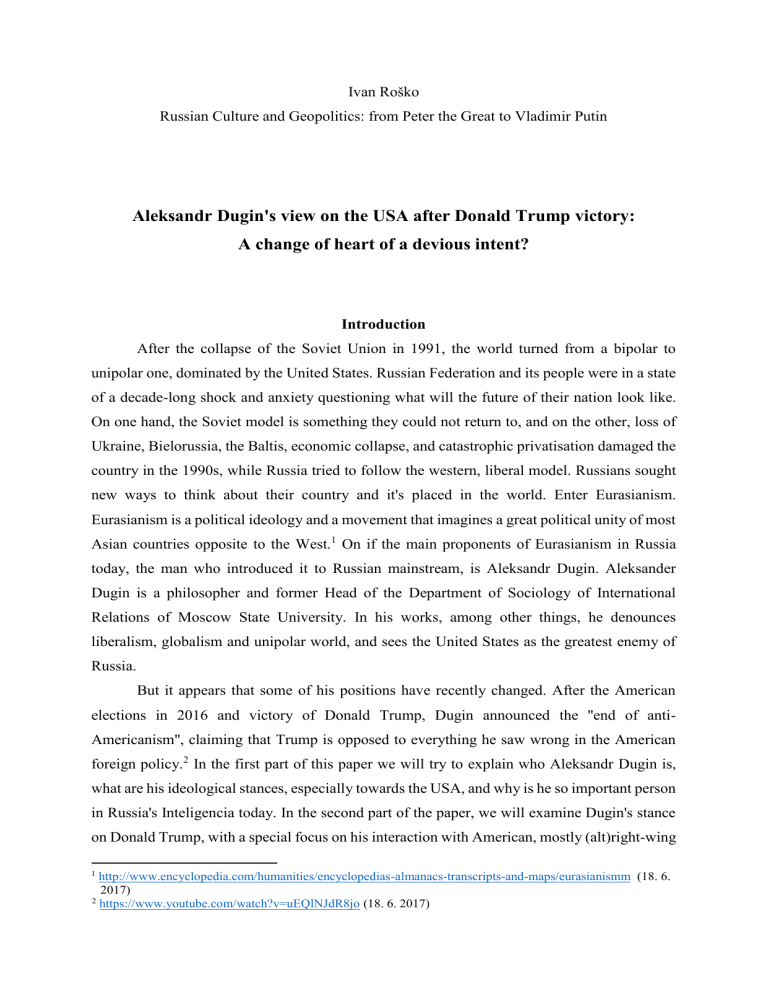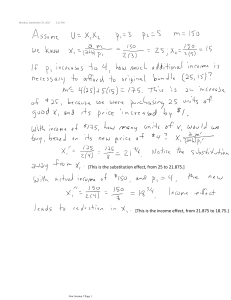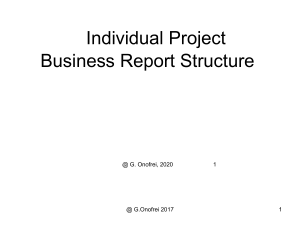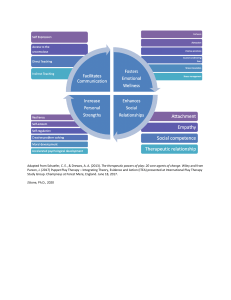Ivan-Roško Aleksandr Dugin's view on the USA after Donald Trump victory - A change of heart of a devious intent?
advertisement

Ivan Roško Russian Culture and Geopolitics: from Peter the Great to Vladimir Putin Aleksandr Dugin's view on the USA after Donald Trump victory: A change of heart of a devious intent? Introduction After the collapse of the Soviet Union in 1991, the world turned from a bipolar to unipolar one, dominated by the United States. Russian Federation and its people were in a state of a decade-long shock and anxiety questioning what will the future of their nation look like. On one hand, the Soviet model is something they could not return to, and on the other, loss of Ukraine, Bielorussia, the Baltis, economic collapse, and catastrophic privatisation damaged the country in the 1990s, while Russia tried to follow the western, liberal model. Russians sought new ways to think about their country and it's placed in the world. Enter Eurasianism. Eurasianism is a political ideology and a movement that imagines a great political unity of most Asian countries opposite to the West.1 On if the main proponents of Eurasianism in Russia today, the man who introduced it to Russian mainstream, is Aleksandr Dugin. Aleksander Dugin is a philosopher and former Head of the Department of Sociology of International Relations of Moscow State University. In his works, among other things, he denounces liberalism, globalism and unipolar world, and sees the United States as the greatest enemy of Russia. But it appears that some of his positions have recently changed. After the American elections in 2016 and victory of Donald Trump, Dugin announced the ''end of antiAmericanism'', claiming that Trump is opposed to everything he saw wrong in the American foreign policy.2 In the first part of this paper we will try to explain who Aleksandr Dugin is, what are his ideological stances, especially towards the USA, and why is he so important person in Russia's Inteligencia today. In the second part of the paper, we will examine Dugin's stance on Donald Trump, with a special focus on his interaction with American, mostly (alt)right-wing 1 http://www.encyclopedia.com/humanities/encyclopedias-almanacs-transcripts-and-maps/eurasianismm (18. 6. 2017) 2 https://www.youtube.com/watch?v=uEQlNJdR8jo (18. 6. 2017) media. We will try to answer the following question: Is the recent change of Dugan's view of America in light of recent Trump victory genuine, or he was more sinister motives to support United State's new president? Aleksandr Dugin: Where does he come from, where does he stand? Born in 1962, Aleksandr Gel'evich Dugin comes from a long line of Russian military officials. His father served as colonel of Soviet military intelligence – GRU. Because of his father, Dugin had access to many things, including education in the West, usually unaccessible for ordinary individuals at the time. Since an early age, Dugin showed to be a bright individual, with un uncanny talent for languages (he said that he mastered nine of them, French and English already during the 80-is). While still in teenage years, he showed resistance for the ruling Soviet communist ideology, associating himself with more right-wing ideas and movements. As a student, he joined a right-wing secretive group of Moscow intellectuals interested in mysticism and paganism.3 As an anti-communist and a dissident, he was questioned quite a few times by the KGB during the 80-is. During the Gorbachev's rule, via glasnost, anti-system figures gain space to voice their opinion and organise themselves. At that time is his mid-twenties, Dugin became a prominent figure of the right-wing, anti-Semitic Russian nationalist organisation, Pamyat. Their leader was the photographer Dmitrii Vasil'ev. During 1989, Dugin even served as a member of the Pamyat' Central Council.4 That same year though, when USSR was more open than ever, Dugin begin a journey across Western European countries, which lasted almost a year. At this time, he made contacts with obscure right-wing leaders in Europe, but also with leading figures of European New Right, such as Frenchman Alain de Benoist and Belgian Jean-Francois Thiriart. During this time, Dugin had an important realisation that formed him ideologically for years to come. Although a long time anti-communist, he realised that Western Europe houses even more dangerous, and a more alien ideology to the Russian people. That is liberalism, with it's individualistic and globalist outlook on the world. 5 Coming back to Russia, Dugin, along with Aleksandr Prokhanov and other right-wing activists in Russia gathered around the journal Den, and formed the National Salvation Front (NSF). They were soon joined by over 3000 former communists. Most known among them was 3 Dunlop, Aleksandr Dugin's Foundations of Geopolitics, 1. Ibid, 1. 5 Ibid, 1. 4 Gennady Zyuganov. NSF was protesting against Yeltsin in 1993., claiming him to be a traitor to the West. The Chechen war and internal struggles lead to dissolvent of NSF. Eduard Limonov and Dugin formed the National-bolshevik party, and Gennady Zyuganov became a leader of Communist Party of the Russian Federation (today the second-most powerful party in Russia). Because of electoral failure in 1995, Dugin turns more and more to writing nad scholarly work.6 He graduated in economics and management at Novocherkass Meliorative State Academy in the Rostov Oblast in 1999, defended his post-graduate degree in Philosophy in 2000, and completed his PhD in the Faculty of Sociology in 2004. In 2007 he became a professor in the Faculty of Sociology of the Moscow State University and in 2008 he was elected Head of the Department of Sociology of International Relations at the same University. During that time he published numerous works. Two most successful ones, and at the same time most crucial ones to understand his ideology are The Foundations of Geopolitics: The Geopolitical Future of Russia (1997, coauthored with General Nikolai Klokotov of the General Staff Academy) and The Fourth Political Theory (2009).7 Dugin's ideology is a rather complex issue, but we will try to explain it's main points, without getting into too much detail. We will mostly extract it from the books mentioned above and from his talks and media appearances. One of the basics of his ideology is anti-Modernity. According to Stephen Shenfield: "Crucial to Dugin's politics is the classical concept of the 'conservative revolution' that overturns the post-Enlightenment world and installs a new order in which the heroic values of the almost forgotten 'Tradition' are renewed''.8 Unlike the Enlightenments ''individual'', the prime subject of Dugin's political ideology is the collective, or ''the nation'' – Russian nation. He proposes a radical slogan: “The nation is everything; the individual is nothing” (p. 257). This slogan encapsulates Dugin’s base position.9 Dugin sees Russia a kind of ''holy land'', undivided Empire, and Russians as people with a historical, messianic mission in the world. Russia is also seen necessarily as an empire. Accepting the Western logic of democratic nation of individuals would, according to Dugin, mean the end of Russia. As he states in The Foundations of Geopolitics: ''A repudiation of the empire-building function would signify the end of the Russian people as a historical reality, as a civilizational phenomenon. Such a repudiation would be tantamount to national suicide" (197). Deprived of an Empire, Russians will "disappear as a nation" (251). The sole viable 6 Horvat, O autoru ove knjige, 8. http://debateolavodugin.blogspot.com/2011/01/alexandr-dugin.html (18. 6. 2017) 8 Dunlop, Aleksandr Dugin's Foundations of Geopolitics, 2. 9 Ibid, 7. 7 course, in Dugin's view, is for Russians to rebound from the debacle of 1989-1991 by recreating a great "supra-national empire," one in which ethnic Russians would occupy "a privileged position" (251-252). 10 Contradictory, at the same time he sees Russian identity as trans-ethnic, a sort of a ''glue'' to combine and collect all ethnicities living in Russia.11 Dugin's theory of Euroasism and Russia's relations with other countries is closely tied to one of his key thesis: the dichotomy of ''peoples of the “large spaces” on the continent'' (the land-bound “tellurocracies” – like Russia) that have a fundamental difference in worldview from the ''bourgeois sea-faring Atlantic civilization'' (the “naval thassalocracies” – like USA or UK.).12 Dugin theorises that ''continental powers tend to authoritarianism and the trading naval powers tend to democracy''13. He, therefore, proposed a union of the continental countries based on that common traditions and dispositions. A formation of the axis “Russia- Germany-JapanIran.” (the fact that Germany is Western power and Japan is a trading naval power he conveniently bypasses) , against liberal and democratic West lead by Russia's most dangerous enemy, United States of America.14 Dugin's anti-Americanism and his influence in Russia For Dugin, points of conflict between Russia and USA are numerous. Dugin considered Cold War era not only as a simple ideological conflict between the capitalist West and the socialist East that can be resolved with Russia's adopting of Western liberalism. He rather considers that differences between the two go much deeper, and describes them as ''the geopolitical struggle between two civilisations''. That is something that, in Dugins opinion, Russian elites in the 1990s failed to realise, which lead to a nation-wide state of anxiety. But, it was soon clear to everyone that ''the Cold War was not a manifestation of a philosophical duel of ideology but the expression of a historical constant independent of socio-political specifics''.15 Those differences primarily stand from Western secular, modern liberalism, which is totally incompatible with Russian communal traditions and Orthodoxy. But the mentioned incompatibility would not be of such significance, if not for a unipolar world, dominated by the USA. 10 Ibid, 7. (All quotes from the The Foundations of Geopolitics were taken from Dunlop's review). Dunlop, Aleksandr Dugin's "Neo-Eurasian" Textbook, 109. 12 Arnold and Romanova, The “White World's Future?”, 87. 13 Ibid, 88. 14 Ibid, 87. 15 Smith, The Masks of Proteus, 485. 11 One of the major crimes of American domination for Dugin is cultural homogenization. Dugin considers ‘’physical extinction, loss of language, assimilation, and loss of traditional culture to be irreparable losses for mankind" and claims that USA hegemony is causing the ''death of cultures''. According to him, "nobody has the right to force my people to lose its uniqueness in a global melting.''16 Russia has no chance but to create Eurasia, founded on ''nonliberal and non-Modern tradition on the basis of Fourth Political Theory, peacefully with the cold indifference of the liberal Americano-centric globalist West'' which will create a multipolar world, where every civilisation would fully autonomously create it's own cultural and political life. But, even Dugin doubts this vision. He states several times that any a peaceful coexistence in near impossible. ‘'The West will immediately intervene and it intervenes now'' and that ''war is imminent! ''17 America cannot stop its drive for global predominance. This drive, intrinsic to the very nature of American civilisation, it's liberal and universal view of human experience and good governance has made the USA similar to the ''great empires of antiquity'', bound to collapse.18 According to Dugin, the West uses the ''strategy of the Anaconda'' to exert unrelenting pressure on all of the coastal zones of Eurasia (not that much unlike policy of ''Containment '' during Cold War). There are several ways Russia is to contradict this and release the ''Anaconda’s grip''. For example, Dugin writes: ''In the beginning stage (of the struggle against Atlanticism), Russia can offer its potential partners in the East and West its resources as compensation for exacerbating their relations with the U.S….” with ‘’all levels of geopolitical pressure... activated simultaneously’’ (p.367). 19 The key strategy for this is the formation of three key axis: Moscow-Teheran, MoscowBerlin and Moscow-Tokyo. For Russian plans on Europe, Dugin writes: "The task of Moscow is to tear Europe away from the control of the U.S. (NATO), to assist European unification, and to strengthen ties with Central Europe under the aegis of the fundamental external axis MoscowBerlin. Eurasia needs a united, friendly Europe" (369). He regards Moscow-Berlin axis possible on "the principle of a common enemy (that is, the United States)" (216), as he believes that Germany has a strong anti-American sentiment that can be used to Russian advantage. The formation of a “Franco-German bloc'' is especially and to be supported (p. 171). 20 16 Dunlop, Aleksandr Dugin's "Neo-Eurasian" Textbook, 110. http://www.academia.edu/17674206/Alexander_Dugin_on_Martin_Heidegger_Interview_ (18. 6. 2017) 18 Dunlop, Aleksandr Dugin's "Neo-Eurasian" Textbook, 113. 19 Dunlop, Aleksandr Dugin's Foundations of Geopolitics, 8. 20 Ibid, 9. 17 Regarding Ukraine, Dugin is quite brutal: ''Ukraine as a state has no geopolitical meaning. It has no particular cultural importance or universal significance, no geographic uniqueness, no ethnic exclusiveness'' (p. 377) ... it represents an enormous danger for all of Eurasia and, without resolving the Ukrainian problem, it is in general senseless to speak about continental politics''. Therefore, he considers that Ukraine needs to cease to exist.21 But, it needs to be noted that in the Dugin's endgame, other parts of Europe won't fare much better. ''The maximum task (of the future), '' Dugin states, ''is the ‘Finlandization’ of all of Europe…'' (p. 369).22 What that means is that the whole of Europe (apart from the UK) needs to be integrated into the Russian-dominated Eurasian empire into a single formation "with maximal cultural autonomy, but with strategic integration into the Eurasian bloc", a fate he plans for Finland in the immediate, closer future. (371-372).23 Regarding Iran, Dugin considers it the greatest Russian ally, it's shield on the South against secular Turkey and ''Islamic Saudi Arabia'' with its 'dangerous Wahhabism''. Along with Japan, Iran is also to be an Asian ally against China. Dugin considers China ''the most dangerous geopolitical neighbour of Russia to the South'' (p. 359). It is a danger to Russia both ''as a geopolitical base for Atlanticism and by itself, as a country with heightened demographic compactness in quest of ‘no man’s land''(p. 360), that is to say, the Kazakhstan and Eastern Siberia.24 But all of these the alliances and geopolitical trade-off are aimed primarily at the USA Seeing his ideas and rhetoric out of Western perspective, Dugin seems like not only a proto- fascist and overly ambitious, but also extremely dangerous if his ideas are adopted as official Russian policy. As stated by Russian journalist Alexander Nevzorov: "if we had had Sergey Kurginyan and Dugin instead of Putin, there would have been hell for all of us to pay, they would have unleashed a European and World War without a shadow of a doubt, without considering consequences at all."25 Measuring Dugin's influence is no easy task. Foreign observers are very careful when estimating it. It is by no means decisive, but it isn't marginal either. It is safe to say that Vladimir Putin does not take his daily geopolitical advice from Dugin and that his nickname ''Putin's brain'' is misplaced. At various points, they agree but differ in many others. On the other hand, Dugin is an advisor to some senior Kremlin officials like late Gennadiy Seleznyov and former Chairman of the State Duma, United Russia party's Sergei 21 Ibid, 10. Ibid, 10. 23 Ibid, 9. 24 Ibid, 12. 25 https://sobesednik.ru/dmitriy-bykov/20141017-aleksandr-nevzorov-rossiyu-zhdet-raspad-po-sovetskomuscenar (18. 6. 2017) 22 Naryshkin.26 Also, one has to mention his presence in the mainstream. Dugin's numerous publications and frequent TV appearances have ''become part and parcel of the daily political and intellectual life of contemporary Russia''.27 All this shows that we gave a voice to many Russians that longed for a strong, respected country and viewed the USA as an existential danger. With recent events like Ukrainian crisis and the rise of the (alt)right, his ideas are likely to become more and more popular, especially in the context of recent changes in the USA. ''Dugin delight'' of Donald Trump United States Presidential elections of 2016 were a momentous historical moment. The world was shaken by the election of businessman Donald Trump for president. Trump ran under motto ''America First'', finding numerous supporters among right-wing movements, not just in the country but abroad as well. Trump's victory was presented as a victory against the ''globalist elites'', who ''control America'' and want to control the world too. Aleksandr Dugin also supported him and after his victory and seemingly changed his longstanding opinion on an inevitable conflict between USA and Russia. Like most of the alt-right media in SAD, Dugin thinks Trump’s victory is a monumental strike to ''globalists'', against their candidate was Hillary Clinton. Almost the same point can be seen in right-wing American websites like Breitbart News, Drudge Report and conspiracy ''expert'' Alex Jones (Dugin was a guest on his show, ''The InfoWars'', a few times). For him, Trump's victory marks a ''revolution'' of the American people, or ''American nation'', against the ''globalist agenda'' lead my the ''establishment swamp''.28 In his show, ''Dugin's guideline'' (in English, obviously directed to the English-speaking audience) he proclaims that ''Trump's ascent first and foremost puts a decisive end to the unipolar world'' with Trump ''directly rejecting US hegemony'' is all its forms. He also stated that ''November 8th, 2016 was an important victory for Russia and Putin personally''. Trump's victory means that multipolar world can finally be created ''not through war, but through peace'' because his America is not globalist or in favour of ''expansion of liberal ideology, but ''traditional and conservative, healthy, and worthy of respect'' which is ''brilliant news'' because a ''dialogue can be held with this kind of America''. Most importantly, he proclaimed that: ''After these elections, we should 26 https://www.theguardian.com/world/2014/mar/23/ukraine-crimea-what-putin-thinking-russia (18. 6. 2017) Shekhovtsov and Umland, Is Aleksandr Dugin a Traditionalist?, 680. 28 http://bigthink.com/paul-ratner/the-dangerous-philosopher-behind-putins-strategy-to-grow-russian-power-atamericas-expense (18. 6. 2017) 27 abandon simplistic anti-Americanism'' which is now ''misplaced'' because: ''If America, like Trump promised, focuses on its internal problems and leaves humanity alone, then there is no longer any reason to hate it.'' Of course, he also directed a few blows to ''countless NGO's and foreign agents in Russia'' who ''will lose even more support'' with Trump victory. The biggest threat to them is, of course, The Soros Foundation (just as it is the minds of the rest of Europe's new right). Trump, according to him ''does not consider LGBT, feminism, and postmodernism to be the last words of progress, but a disease'' (like Russians?). In the end, he proclaims that: ''Today, our time has come. This is a window of opportunity and it is open. If we fail to use it now, we will have only ourselves to blame''. 29 When he was interviewed by Alex Jones's Infowars, which Dugin calls ''the most powerful resource of true information in the US'' which through Jones ''expresses the position of real America''3031, Dugin called on Trump to accept his ''special mission'' on destroying what they both called ''Organised Evil'' of the ''globalists''. Their origins, Dugin found in British Empire, saying that ''America and Russia are returning to their old natural alliance'' that they had more than two centuries ''against the British Empire''. Interestingly, when Jones would mention any differences between their ideologies (like the right to bear arms), Dugin would change the subject, avoiding those discussions (with Jones not pushing, quite the contrary).32 But maybe the best example of a comparison of (alt)right ideology in America and Dugin ideology can be presented by showing the differences between him and one of chief Trump's advisors, Steve Bannon, who is a former editor of Breitbart News, the largest alt-right news broadcast in the USA. After Trump victory, Dugin set his sights on the next target, Wester Europe, proclaiming on his website right before the French election: ''let us (now) drain the European Swamp...What is the structure of the Swamp? First of all, the Swamp is an ideology, Liberalism. We need a Nuremberg Trial for Liberalism, the last totalitarian political ideology''. When Dugin says that, his saying it from a Russian-nationalist, Islamist-Orthodox-Christian point of view. This is very different from Bannon view. Bannon opposes liberal and secular humanism in the name of the "Judeo-Christian" Western world and is very much opposed to 29 https://www.youtube.com/watch?v=uEQlNJdR8jo (18. 6. 2017) Unlike Jones's lawyer who recently represented him in a case against his ex-wife for custody for their three children. He claimed that Jones in Info Wars is a ''performance artist playing a character'' (http://www.independent.co.uk/news/infowars-alex-jones-performance-artist-playing-character-lawyerconspiracy-theory-donald-trump-a7687571.html (18. 6. 2017)). Jones himself does not help to justify Dugin's praise either, recently claiming that the ''globalist elite'' are really ''interdimensional paedophile psychic vampires (one has to hear it believe it... - https://www.youtube.com/watch?v=MkMnwFZyNrw (18. 6. 2017)). 31 https://www.youtube.com/watch?v=uEQlNJdR8jo (18. 6. 2017) 32 https://www.youtube.com/watch?v=L4YM3XJDEK0 (18. 6. 2017) 30 Islam, whose parts Dugin see as compatible and as allies in his struggle. 33 More importantly, they are not attacking the same ''liberalism''. In Dugin's view, liberalism is the prime Western ideology, based on the individual, which begun with Modernity itself, arguing for a strong, authoritarian state. Bannon, the ''American nationalist'', wants to ''destroy the state'' (it's centralised administration) to free the will of sovereign people. He defends individualism, but critiques neoliberalism (unregulated markets) and ''American liberalism'' embodied mostly in the Democratic party. Those are fundamental differences. But to be fair, there are a lot of similarities as well; they are both opposed to globalism, unchecked free market, secularism, multiculturalism, egalitarianism. minority right (like LGBT or race positive discrimination), feminism and postmodernism.34 They both think that ''the true global ideological struggle is not between Russia and the United States but between culturally homogenous groups founded on Judeo-Christian values practising humane capitalism on one side and, on the other, an international crony-capitalist network of bankers and big business.''35 Dugin's ''Long game'' But now, let us look a little closer. Does not Dugin's newfound sympathy for Trump's America seem a little bit schiszofrenic? Where has gone the logic of ''bourgeois sea-faring Atlantic civilisation'' as a natural enemy of the Eurasian Empire? Civilisational differences, that were in development for centuries, were swept away with an election of one president? Does Dugin really believe that a 'beginning of an American revolution'' with Trump on its forefront is really happening? Probably not. American foreign policy (controlled by the ''deep state'') towards Russia does not change with its presidents, no matter how anti-establishment they may be (said by Putin as well, as recently shown ''Putin interviews'' with Oliver Stone).36 Dugin is well aware of that and well aware that no matter how Trump is different from his predecessors, his time is limited, and his agency to change policies is even more limited. So why does Dugin seem so supportive of Trump and the alt-right movements gathered around him? A part of the answer can be found in his The Foundations of Geopolitics. To fight the ''Anacondas grip'' of USA, Dugin mentioned not only international measures helped by other countries but direct actions against America. Those are of course not military actions, but far 33 http://www.economist.com/blogs/erasmus/2016/11/america-russia-and-new-right (18. 6. 2017) http://www.economist.com/blogs/erasmus/2016/11/america-russia-and-new-right (18. 6. 2017) 35 http://www.newsweek.com/steve-bannon-donald-trump-jared-kushner-vladimir-putin-russia-fbi-mafia-584962 (18. 6. 2017) 36 https://www.youtube.com/watch?v=L1Uf6yMa1dg (18. 6. 2017) 34 more subtle ones. For example, he expresses a need for the Russian special services and their allies "to provoke all forms of instability and separatism within the borders of the United States (it is possible to make use of the political forces of Afro-American racists)" (248). Dugin openly states: "It is especially important, to introduce geopolitical disorder into internal American activity, encouraging all kinds of separatism and ethnic, social and racial conflicts, actively supporting all dissident movements--extremist, racist, and sectarian groups, thus destabilizing internal political processes in the U.S. It would also make sense simultaneously to support isolationist tendencies in American politics" (367).37 The short answer: Dugin in doing his own part in destabilising and dividing America, a plan he outlined in his book 20 years ago! For Dugin's goal of weakening American influence and power, a divided America is needed. United States today are as divided as they had been during the Vietnam War. The rightwing militias are appearing across the country, with some of them expecting a new Civil War.38 The ''liberal left'' are violently rioting on campuses and even sets buildings on fire employing even Molotov cocktails.39 And although a black president was in the White House for eight years, racial relations got worse!40 They exploded with incidents like Ferguson shooting and riots in 2015 and recent Portland stabbings. 41 Issues like this serve Russian officials and media to present the American system ''no worse than ours'', that they ''both have problems'' and that American democracy is real ''dysfunctional''.42 Trump is not the cause of these problems, but he isn't helping, despite promising to unite the country in his inaugural speech.43 Even worse, his outlandish rhetoric and lack of statesmanship combined with the internal power play inside his inner circle lead to the slowest transition in the history of the country, which left the whole administration terribly understaffed, with key positions still vacant (data from April)!44 This is especially true for The State Department, which renders American foreign policy much weaker.45 The described situation is exactly what Dugin sees as weakening America from within. By talking to an English-speaking audience, he pretends to be close to their (extreme)right- 37 Dunlop, Aleksandr Dugin's Foundations of Geopolitics, 8. https://www.theguardian.com/world/2010/mar/04/us-surge-rightwing-extremist-groups (18. 6. 2017) 39 http://www.washingtontimes.com/news/2017/mar/1/liberal-left-employs-violence-to-accomplish-goals/ (18. 6. 2017) 40 http://www.washingtontimes.com/news/2016/jul/19/race-relations-reach-all-time-low-under-obama-poll/ (18. 6. 2017) 41 https://www.vox.com/identities/2017/5/30/15711640/portland-stabbing-hate-crime (18. 6. 2017) 42 https://www.youtube.com/watch?v=E_WPk6Rxx00 (Putin's interview with Megyn Kelly. 18.6.2017) 43 http://www.politico.com/story/2017/01/donald-trump-divided-america-233652 (18. 6. 2017) 44 http://www.cnbc.com/2017/04/13/trump-administration-hasnt-even-named-candidates-for-hundreds-of-keypositions.html (18. 6. 2017) 45 https://www.theatlantic.com/international/archive/2017/03/state-department-trump/517965/ (18. 6. 2017) 38 wingers, support Trump and tries to demonise the liberal America. He is essentially adding fuel to the fires of American divide, pretending that the ''True America'', lead by Trump, is a country Russia can befriend. Dugin knows well that geopolitical interests of both countries can not align, no matter the ideological and political positions of their leaders. He is playing his part in a calculated ''long game'' against the United States. Conclusion Aleksandr Dugin is a dangerous proponent of Eurasianims, a Russian imperial ideology. He considered Modernity, liberalism, individualism and democracy as poisonous and sees the United States, the ultimate enemy of Russia, as physical manifestation of their dangers. With victory of Donal Trump, Dugin seemingly changed his stance, supporting the new president and rejecting his long-standing anti-Americanism. But that is all a ruse. Dugin is playing his part in his vision of dividing and weakening American society and political process. His goal is weaker America, not ''peoples America''. By exposing Dugin's long term goals and motives for his ''support'' of Trump, this paper also serves as a warning to the (alt)right-wing part of United States, especially those watching Alex Jones. Although it is hard to recognise a friend from foe in today's digital age of ''fake news'' and ''alternative facts'', Aleksandr Dugin is not their ally, much less their friend. Along with him or adopting his views serves to no interest of their country. Looking from the prism of USA-Russia conflicts (or even better, from Dugin's view of ''inevitable war''), alt-right in America following Dugin is, plainly put, ''in bed with the enemy'' and plays the role of a ''fifth column'' inside their own country. For all those who consider themselves American patriots, who want to ''defend the Constitution and laws of the United States of America against all enemies, foreign and domestic'', that is one role they do not wish to play. Bibliography: Arnold, Richard and Romanova, Ekaterina. ''The “White World's Future?” An Analysis of the Russian Far Right'', Journal for the Study of Radicalism, Vol. 7, No. 1 (2013): 79-107. Dunlop, John B. '' Aleksandr Dugin's Foundations of Geopolitics''. Demokratizatsiya, Vol. 12, No. 1 (2004). (reviewed edition: Aleksandr Dugin, Aleksandr. Osnovy geopolitiki: Geopoliticheskoe budushchee Rossii (Moscow: Arktogeya, 1997). All quotes from the book were taken from Dunlop's review) (Source: https://www2.gwu.edu/~ieresgwu/assets/docs/demokratizatsiya%20archive/GWASHU _DEMO_12_1/John%20Dunlop%20Aleksandr%20Dugin's%20Foundations%20of%2 0Geopolitics.pdf 18.6.2017) Dunlop, John, B. ''Aleksandr Dugin's "Neo-Eurasian" Textbook and Dmitrii Trenin's Ambivalent Response'', Harvard Ukrainian Studies, Vol. 25, No. 1/2 (2001): 91-127. Horvat, Alen. “O autoru ove knjige” (9-16). Konspirologija. Zagreb: Zadruga Eneagram, 2013. Shekhovtsov, Anton and Umland, Andreas. ''Is Aleksandr Dugin a Traditionalist? "NeoEurasianism" and Perennial Philosophy'', The Russian Review, Vol. 68, No. 4 (2009): 662-678. Smith, Graham. ''The Masks of Proteus: Russia, Geopolitical Shift and the New Eurasianism'', Transactions of the Institute of British Geographers, Vol. 24, No. 4 (1999): 481-494 Internet sources: Articles: http://www.encyclopedia.com/humanities/encyclopedias-almanacs-transcripts-andmaps/eurasianismm (18. 6. 2017) http://debateolavodugin.blogspot.com/2011/01/alexandr-dugin.html (18. 6. 2017) http://www.academia.edu/17674206/Alexander_Dugin_on_Martin_Heidegger_Interview_ (18. 6. 2017) https://sobesednik.ru/dmitriy-bykov/20141017-aleksandr-nevzorov-rossiyu-zhdet-raspad-posovetskomu-scenar (18. 6. 2017) https://www.theguardian.com/world/2014/mar/23/ukraine-crimea-what-putin-thinking-russia (18. 6. 2017) http://bigthink.com/paul-ratner/the-dangerous-philosopher-behind-putins-strategy-to-growrussian-power-at-americas-expense (18. 6. 2017) http://www.independent.co.uk/news/infowars-alex-jones-performance-artist-playingcharacter-lawyer-conspiracy-theory-donald-trump-a7687571.html (18. 6. 2017) http://www.economist.com/blogs/erasmus/2016/11/america-russia-and-new-right (18. 6. 2017) http://www.newsweek.com/steve-bannon-donald-trump-jared-kushner-vladimir-putin-russiafbi-mafia-584962 (18. 6. 2017) https://www.theguardian.com/world/2010/mar/04/us-surge-rightwing-extremist-groups (18. 6. 2017) http://www.washingtontimes.com/news/2017/mar/1/liberal-left-employs-violence-toaccomplish-goals / (18. 6. 2017) http://www.washingtontimes.com/news/2016/jul/19/race-relations-reach-all-time-low-underobama-poll/ (18. 6. 2017) https://www.vox.com/identities/2017/5/30/15711640/portland-stabbing-hate-crime (18. 6. 2017 http://www.politico.com/story/2017/01/donald-trump-divided-america-233652 (18. 6. 2017) http://www.cnbc.com/2017/04/13/trump-administration-hasnt-even-named-candidates-forhundreds-of-key-positions.html (18. 6. 2017) https://www.theatlantic.com/international/archive/2017/03/state-department-trump/517965/ (18. 6. 2017) Videos: Dugin on Donald Trump's Victory: https://www.youtube.com/watch?v=uEQlNJdR8jo (18. 6. 2017) Psychic Vampires, Pedophilia & Consciousness with Alex Jones: https://www.youtube.com/watch?v=MkMnwFZyNrw (18. 6. 2017) Aleksandr Dugin joins Joins Alex Jones on Info Wars: https://www.youtube.com/watch?v=L4YM3XJDEK0 (18. 6. 2017) Oliver Stone - The Putin Interviews, Part 1: https://www.youtube.com/watch?v=L1Uf6yMa1dg (18. 6. 2017) Putin's interview with Megyn Kelly: https://www.youtube.com/watch?v=E_WPk6Rxx00 18.6.2017)




